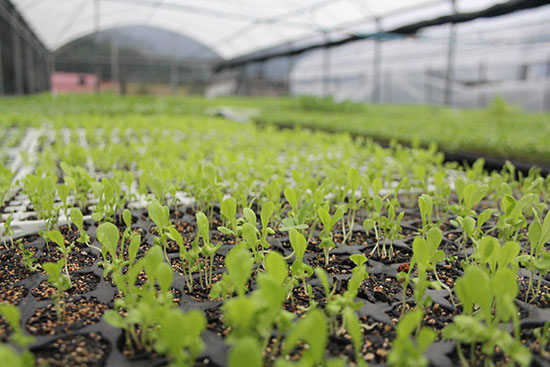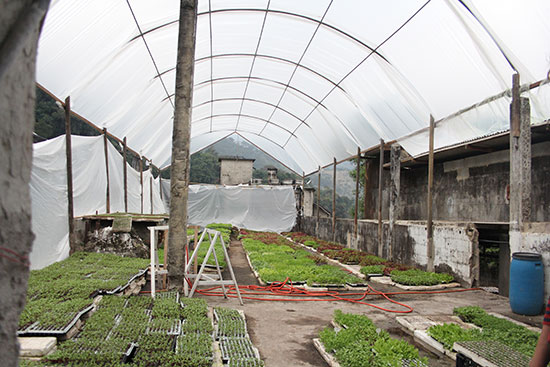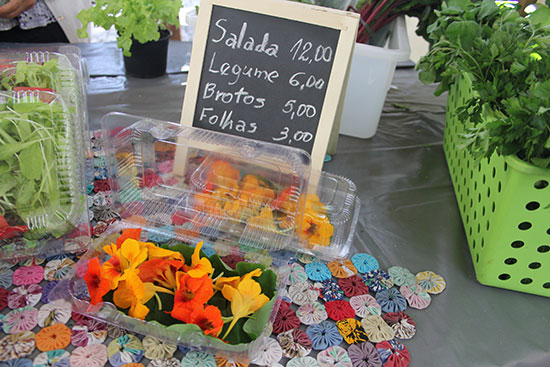An Abandoned Quarry Above Rio’s Olympic Village Finds New Life as an Organic Farm
The organic food movement in Brazil is relatively tiny – but growing at a breakneck pace.
An Abandoned Quarry Above Rio’s Olympic Village Finds New Life as an Organic Farm
The organic food movement in Brazil is relatively tiny – but growing at a breakneck pace.

The whole place, in fact, is bursting with life. Organic greens and peas and carrots grow in neat beds that checker the ground; nasturtium blooms add a splash of brilliant color. Inside two greenhouses, tightly packed trays of seedlings and microgreens form a sort of electric green carpet. And the dripping, chirping forest just outside appears poised for invasion. It’s a testament to nature’s resilience – and Anselmo’s determination – that only a few short years ago, this was an industrial wasteland, strewn with piles of rock and trash.
“I achieved my dream in this beautiful spot,” says Anselmo, of her bustling farm, Orgânicos da FÁ¡tima. “A dead place has come to life.”
Back in the late 1990s, Anselmo decided it was time for a career change, ditching her job as a teacher for farming. She lived in the mountains that rise above Rio, and getting her operation off the ground proved difficult. Eventually, though, she was delivering fresh vegetables to the city three times a week, selling to restaurants, hotels, and direct to consumers. Then, in early 2011, a torrential downpour and devastating flood washed most of Anselmo’s operation off the map (a tragedy dwarfed by the disaster’s death toll of more than 900).

For a short time, she moved to another piece of land in the mountains, but, tired of the hours-long delivery trips and intrigued by the idea of urban agriculture, she began using Google Maps to scout plots closer to the city. In 2014, she spied a promising bit of open land in ItanhangÁ¡, on an ocean-facing hillside overlooking the ritzy part of Rio where the Olympic Village has since been erected. She paid a visit in person, ran her ideas past the owner, and walked away with a lease. There was a catch, though: Since the quarry shut down decades earlier, the land had become a dumping ground. It looked more like a war zone than farmland, and Anselmo’s friends, her financial adviser and even her husband tried to talk her out of what seemed, to them, a fool’s errand.
She plowed ahead and spent more than a year and a half hauling out rubble and trash and renovating a ruined building (now office space and a prep room). She harvested organic produce on site in 2015; along the way, the naysayers have become believers.
The success of Orgânicos da FÁ¡tima owes much to Anselmo’s loyal clients, who encouraged her from day one of her quarry reclamation project. Acclaimed Rio chef Robert Sudbrack, of the eponymous farm-to-table restaurant, describes Anselmo as an innovative farmer who tends her crops with love and skill. “She grows jewels on that farm,” Sudbrack told Modern Farmer in an email. “Supporting small farmers is crucial. Our work isn’t possible without them.”

Anselmo estimates that restaurants and hotels make up about 70 percent of her business. (The Olympics – great news for any host city’s hospitality industry – have been very good to Orgânicos da FÁ¡tima). The rest of her sales take place at the organic farmers markets that have begun popping up all over Rio; a decade ago, there was a single such market in all of Rio, according to ABIO, an organic farmer’s association. Today, there are 19.
“People are talking more about the markets now,” says FlÁ¡via Semenow, a nutritionist and regular customer of Anselmo’s, who stopped by the booth at a Tuesday market in the quiet neighborhood of Laranjeiras. Her phone is full of pictures of dishes she’s made, sprinkled with Anselmo’s microgreens and edible nasturtium blossoms, called capuchinha in Portuguese. That Laranjeiras market, with around a dozen vendors, is a relatively small one. Anselmo frequents six other markets through the week; the biggest are on Saturdays in Jardim Botânico and Tijuca, two districts separated by the Corcovado, the iconic mountain topped with the towering statue of Jesus.
As a whole, the Brazilian economy is two years into a historic recession that has cost the country millions of jobs. This little organic farm in ItanhangÁ¡ has won a handful back. Anselmo’s two teenage sons help out at the weekend stands. Two sisters and a brother are among the 10 people employed at Orgânicas da FÁ¡tima. A brick mason who helped renovate the farm office is now an employee, as is a woman who worked for a time as a housekeeper for Anselmo.

Organic farmers in Brazil still face plenty of challenges, Anselmo says, but the general trend is extremely positive. The country’s organic food sector grew by 25 percent in 2015, even as the national GDP fell by 3.8 percent. With less than 1 percent of market share, the organic scene in Brail is still tiny. But good news is good news, and it’s been in short supply in Brazil of late.
Progress has come in fits and starts in her nearly 20 years in the business. But here in ItanhangÁ¡, the vibrant farm – dotted with blooming borage and calendula, radish beds, banana trees, and an herb garden – represents unqualified victory.
“I always wanted to show that urban agriculture was possible,” Anselmo says. “If everyone did just a little bit of this, we’d have much healthier food and a much healthier world.”
Follow us

This work is licensed under a Creative Commons Attribution-NoDerivatives 4.0 International License.
Want to republish a Modern Farmer story?
We are happy for Modern Farmer stories to be shared, and encourage you to republish our articles for your audience. When doing so, we ask that you follow these guidelines:
Please credit us and our writers
For the author byline, please use “Author Name, Modern Farmer.” At the top of our stories, if on the web, please include this text and link: “This story was originally published by Modern Farmer.”
Please make sure to include a link back to either our home page or the article URL.
At the bottom of the story, please include the following text:
“Modern Farmer is a nonprofit initiative dedicated to raising awareness and catalyzing action at the intersection of food, agriculture, and society. Read more at <link>Modern Farmer</link>.”
Use our widget
We’d like to be able to track our stories, so we ask that if you republish our content, you do so using our widget (located on the left hand side of the article). The HTML code has a built-in tracker that tells us the data and domain where the story was published, as well as view counts.
Check the image requirements
It’s your responsibility to confirm you're licensed to republish images in our articles. Some images, such as those from commercial providers, don't allow their images to be republished without permission or payment. Copyright terms are generally listed in the image caption and attribution. You are welcome to omit our images or substitute with your own. Charts and interactive graphics follow the same rules.
Don’t change too much. Or, ask us first.
Articles must be republished in their entirety. It’s okay to change references to time (“today” to “yesterday”) or location (“Iowa City, IA” to “here”). But please keep everything else the same.
If you feel strongly that a more material edit needs to be made, get in touch with us at [email protected]. We’re happy to discuss it with the original author, but we must have prior approval for changes before publication.
Special cases
Extracts. You may run the first few lines or paragraphs of the article and then say: “Read the full article at Modern Farmer” with a link back to the original article.
Quotes. You may quote authors provided you include a link back to the article URL.
Translations. These require writer approval. To inquire about translation of a Modern Farmer article, contact us at [email protected]
Signed consent / copyright release forms. These are not required, provided you are following these guidelines.
Print. Articles can be republished in print under these same rules, with the exception that you do not need to include the links.
Tag us
When sharing the story on social media, please tag us using the following: - Twitter (@ModFarm) - Facebook (@ModernFarmerMedia) - Instagram (@modfarm)
Use our content respectfully
Modern Farmer is a nonprofit and as such we share our content for free and in good faith in order to reach new audiences. Respectfully,
No selling ads against our stories. It’s okay to put our stories on pages with ads.
Don’t republish our material wholesale, or automatically; you need to select stories to be republished individually.
You have no rights to sell, license, syndicate, or otherwise represent yourself as the authorized owner of our material to any third parties. This means that you cannot actively publish or submit our work for syndication to third party platforms or apps like Apple News or Google News. We understand that publishers cannot fully control when certain third parties automatically summarize or crawl content from publishers’ own sites.
Keep in touch
We want to hear from you if you love Modern Farmer content, have a collaboration idea, or anything else to share. As a nonprofit outlet, we work in service of our community and are always open to comments, feedback, and ideas. Contact us at [email protected].by Andrew Jenner, Modern Farmer
August 19, 2016
Modern Farmer Weekly
Solutions Hub
Innovations, ideas and inspiration. Actionable solutions for a resilient food system.
ExploreExplore other topics
Share With Us
We want to hear from Modern Farmer readers who have thoughtful commentary, actionable solutions, or helpful ideas to share.
SubmitNecessary cookies are absolutely essential for the website to function properly. This category only includes cookies that ensures basic functionalities and security features of the website. These cookies do not store any personal information.
Any cookies that may not be particularly necessary for the website to function and are used specifically to collect user personal data via analytics, ads, other embedded contents are termed as non-necessary cookies.